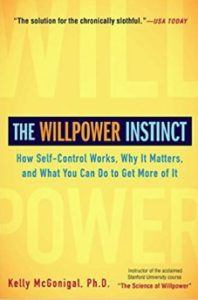In the last lesson, we talked about how we can increase our supply of willpower. I promised that in this lesson we would talk about how willpower works.
We used to think that willpower was either an inborn trait or we believed that people of good character had willpower and people without good character did not. Some thought that you only had so much and then it would be gone; others thought that the more you used your willpower, the more you would have. It was hard to tell who was right until the psychologist Roy Baumeister led us to the most widely accepted understanding of how willpower works.
Willpower Works like a Muscle.
Willpower is like a muscle. This means that if you rely on willpower all day to get through stressful meetings and cope with irritating colleagues and clients, after work, you have very little willpower in reserve to help you say no to temptations. In the Willpower Instinct, McGonigal wrote:
Smokers who go without a cigarette for twenty-four hours are more likely to binge on ice cream. Drinkers who resist their favorite cocktail become physically weaker on a test of endurance. Perhaps most disturbingly, people who are on a diet are more likely to cheat on their spouse. It’s as if there’s only so much willpower to go around. Once, exhausted, you are left defenseless against temptation—or at least disadvantaged.[1]
That is the bad news. The good news is that you can do something about it. You can strengthen the willpower muscle.
In fact, taking on a willpower challenge in one area often improves willpower in other areas. Many people have experienced this phenomenon. They started exercising and then they had the willpower to eat more healthfully. Or, they devoted themselves to more reading and they found television lost much of its appeal.
One fascinating study at Northwestern University found that developing willpower in completely unrelated areas led to lower rates of domestic violence. They asked participants in one group to avoid swearing and to replace the word “yeah” with the word “yes.” They had participants in a second group use their non-dominant hand to open doors, eat, and brush their teeth. A third group was simply a control group. After two weeks, the two groups that worked on these unrelated willpower tasks “were less likely to respond to typical triggering events, like jealousy or feeling disrespected by their partner, with physical violence” [2]
In summary, willpower works like a muscle. If you exercise willpower, you make it grow bigger—and there are spillover effects in unrelated areas. But beware, you can also exhaust your reserve of willpower if you are not careful.
What About You?
What will you do with what you now know about willpower?
References
[1] McGonigal, K. (2012). The willpower instinct: How self-control works, why it matters, and what you can do to get more of it. New York: Avery. (pp. 56).
[2] McGonigal, K. (2012). The willpower instinct: How self-control works, why it matters, and what you can do to get more of it. New York: Avery. (pp. 67).
___________

Dr. Darin Gerdes is a tenured Professor of Management in the College of Business at Charleston Southern University.
All ideas expressed on www.daringerdes.com are his own.
This post was originally created for Great Business Networking (GBN), a networking organization for business professionals where Dr. Gerdes is the Director of Education.
___________

